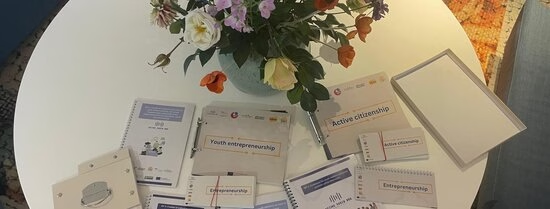TeachEUR
Support
The card game serves as a continuation of the Youth Empowerment Cards game (higher difficulty level) for the promotion and development of active citizenship and entrepreneurial skills. Moreover, the card game enhances the employability of the players, thereby increasing their opportunities in the labour market.
About the game
Through a series of scenario-based cards, players are encouraged to explore real-world challenges, values, and social dilemmas in a safe, structured setting. The game fosters skills such as empathy, civic responsibility, teamwork, and critical thinking, while helping participants articulate their own views and engage meaningfully with diverse perspectives. Suitable for both formal and non-formal learning environments, it empowers youth to better understand their roles within society and take informed steps toward becoming engaged, responsible citizens.
Objectives
The objective of the game is to engage youth in learning about entrepreneurship and active citizenship through a fun and educational card game.
Game mechanics
- Players: The game is best played in small to medium-sized groups (4–12 participants), allowing for rich discussion, peer learning, and inclusive participation. It can also be adapted for one-on-one facilitation or larger group settings with breakout discussions.
- Location: The game is suitable for both formal and non-formal learning environments, such as classrooms, youth centers, community hubs, or workshops. It requires a quiet and comfortable space where participants can sit in a circle or around a table to read and discuss the cards.
- Duration: A typical game session lasts approximately 60 to 90 minutes, depending on the number of players and the depth of discussion. Facilitators may choose to use a selection of cards or multiple rounds based on time availability and learning objectives.
The facilitator needs to read the guidebook and then divides the cards in piles according to the number of groups created.
There are 5 Missions in this deck, each containing instructions for the facilitator and for the group that is going through the missions. You can easily identify which card is for whom: the card for facilitator has the title “Instructions - M1/M2/M3/M4/M5”. M stands for Mission. Moreover, for each Mission, the facilitator has some annexes that will help him/her guide the process of learning. For each Mission, we prepared 5 identical cards with the text of the Mission that the groups can use. This is so that the facilitator can distribute a card to each team. Each facilitator’s card contains information about the purpose of the Mission, the materials needed and the debriefing questions. To be noted: the debriefing questions are guidelines on where the discussion should go. The facilitator is free to play around with the questions, but it is important not to lose focus on the objective of each Mission!
The game is available in English, Dutch, Greek and Romanian.
There is a guide available for the facilitator.
Downloads
The game is accessible online and can be printed in all the above-mentioned languages below, under PR3.

